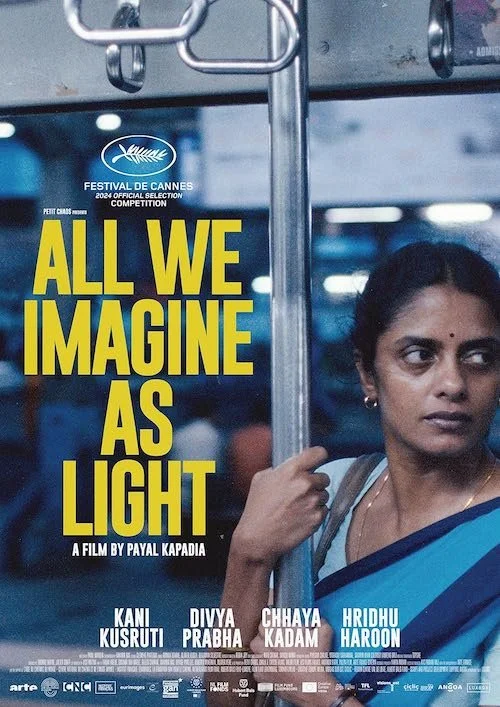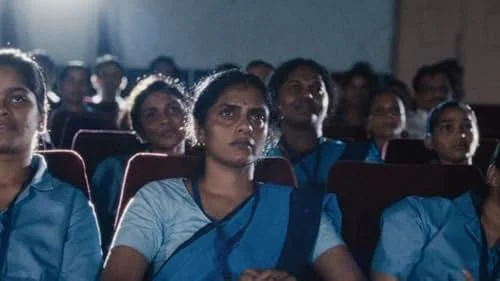All We Imagine as Light
Written by Andreas Babiolakis
Art can be seen as such a pretentious medium by the uninformed, as if only the privileged and elite members of society are worthy of it. However, anyone who pretends that artistic cinema holds these pretenses is either uninformed or an idiot. Cinema has been a vessel for the working and lower classes to share their viewpoints from as far back as the gestation of the medium (in fact, film was once scoffed at by the upper class in its earliest days). I bring this discussion up because it is crucial in understanding the perspectives of filmmakers like the rising star herself, Indian director Payal Kapadia, and her latest release, the beloved All We Imagine as Light. Sure, its cool-toned hues and meditative nature may make this film feel like a profound, untouchable statement, but it doesn’t take long for Kapadia and her motion picture to introduce you to a simple story told by complicated characters and within a very real setting. The richness of All We Imagine as Light may not be instant, but it will come and hit you like a ton of bricks. This is because Kapadia understands what drives us as beings, and it’s the only way a film like this could even work.
Kapadia may not have an heir to her style, but she certainly has influences; the sublime, eye-widening gaze of a lover of anthropology, the human race, and circumstances like Wim Wenders (specifically Perfect Days, in this case); the colourful, fever dream vibe of a Wong Kar-wai (or his greatest disciple, Barry Jenkins); the engaging take on Indian femininity that manages to feel applicable to all cultures like what Mira Nair has accomplished. Even so, Kapadia has made All We Imagine as Light entirely her own feature, given her commitment to lush, soothing storytelling and the two protagonists who carry us through the streets of Mumbai. These characters are Prabha (Kani Kusruti) and Anu (Divya Prabha): roommates who also both happen to be nurses and a part of the Malayali cultrue.
While acting as an analytical lens, All We Imagine as Light is still highly artistically immersive.
We watch a teaser of what the daily lives of both Prabha and Anu are like, and it feels as though that they are wanting that spark that — without ever being said outright — may turn their average existences into something much more than how they wound up. Prabha is married, but her husband lives in Germany and could not be more estranged from her (they barely even communicate with one another by any means); their wedding having been arranged may have something to do with this fate. Meanwhile, roommate Anu is secretly seeing a Muslim man named Shiaz (Hridhu Haroon); they want to get intimate but need to find a place that is secluded enough for them to do so (not only does Anu live with someone else, but I don’t need to explain how busy Mumbai is in general). Together, we get two different tales of love, purpose, and self-discovery.
Furthermore, we get a duo of allegories. Prabha’s story is a take on what unconditional love looks like when it comes to complete devotion to your spouse (especially once that third act storyline gets going, which I won’t spoil or get into here). I love Kapadia’s handling of what could have been a fairy-tale, unrealistic response to the twist she grants us; Prabha could have rocketed herself completely into the stratosphere of leading a fascinating life, but instead she finds comfort in both herself and normalcy. Ana’s story is one of acceptance: being comfortable with who you love, how you love them, and what that love means to you (then again, it isn’t Ana’s role in this story that makes it beautifully come full circle). While Ana doesn’t become a superstar, I feel like she winds up having the fulfillment that both protagonists secretly seek (while I would argue Prabha gets the kind of gratification that she didn’t even know she needed).
All We Imagine as Light cleanly combines two stories into one connected experience.
One thing I love about this film is how it feels like a quest for meaning, and yet the lives of our characters never feel like they are split into parts or chapters. Instead, we see a unified whole, where conquests are intrinsically felt or searched for. These are people who are rooted in reality. Instead of trying to turn them into “interesting” souls, Kapadia made the film showcase them as the already brilliant beings that they are. With all of this in mind, I cannot fathom how neither India or France selected All We Imagine as Light to represent them at the Academy Awards within the Best International Feature Film category (I suppose the latter’s reason is that Emelia Pérez is a highly successful release that will pick up some trophies, and already has).
This is a gorgeous, spiritual celebration of the common people, as if our inner thought of “my life could be a film” was answered by an external, powerful, benevolent force and makes our wish a reality. There’s a reason why this film is stunning crowds everywhere. It is both narratively artistically subtle and multi-faceted, as if to remind us that we view ourselves as underachieved failures while — in reality — we couldn’t be more exceptional simply for existing, let alone in the ways that we undermine. If All We Imagine as Light doesn’t have a chance in hell in the one category it could have been guaranteed for, I foresee awards season success elsewhere (Payal Kapadia did get nominated for Best Director at the Golden Globes, which feels like an uncharacteristic miracle). If cinema has always championed the voices of the middle and lower classes, All We Imagine as Light is another example as to how, as it turns everyday people — and ourselves — into the spectacles of eternity that we always were. Kapadia has a clear handle on filmmaking and storytelling, and I cannot wait to see what she comes up with next.
Andreas Babiolakis has a Masters degree in Film and Photography Preservation and Collections Management from Ryerson University, as well as a Bachelors degree in Cinema Studies from York University. His favourite times of year are the Criterion Collection flash sales and the annual Toronto International Film Festival.








